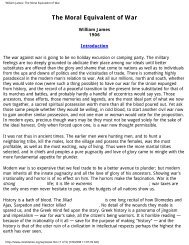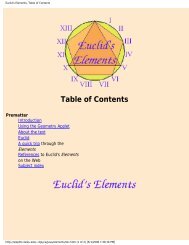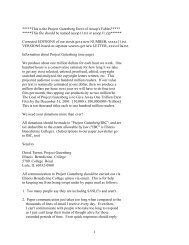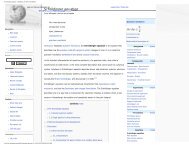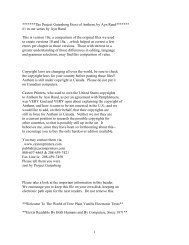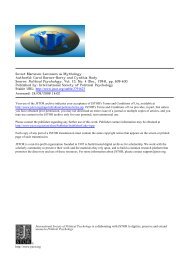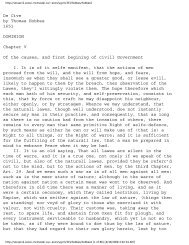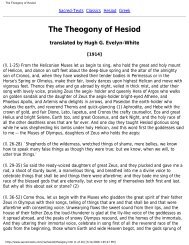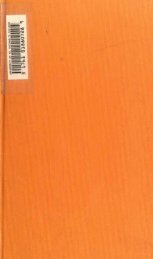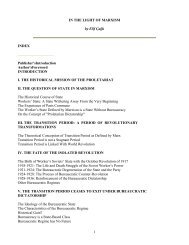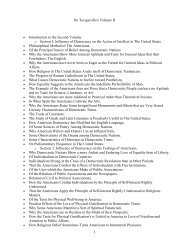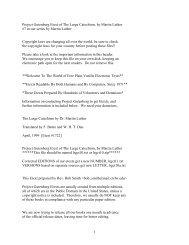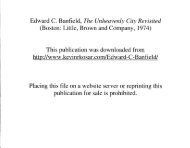Thomas Jefferson: A Manual of Parliamentary Practice
Thomas Jefferson: A Manual of Parliamentary Practice
Thomas Jefferson: A Manual of Parliamentary Practice
Create successful ePaper yourself
Turn your PDF publications into a flip-book with our unique Google optimized e-Paper software.
<strong>Thomas</strong> <strong>Jefferson</strong>: A <strong>Manual</strong> <strong>of</strong> <strong>Parliamentary</strong> <strong>Practice</strong><br />
A question <strong>of</strong> order may be adjourned to give time to look into precedents. 2 Hats. 118.<br />
In the Senate <strong>of</strong> the United States, every question <strong>of</strong> order is to be decided by the<br />
President, without debate: but if there be a doubt in his mind, he may call for the<br />
sense <strong>of</strong> the Senate. Rule 16.<br />
In Parliament, all decisions <strong>of</strong> the Speaker may be controuled by the House. 3 Grey 319.<br />
SEC. XVIII.<br />
ORDERS OF THE HOUSE.<br />
OF right, the door <strong>of</strong> the House ought not to be shut, but to be kept by porters, or serjeants<br />
at arms, assigned for that purpose. Mod. Ten. Parl. 23.<br />
By the rules <strong>of</strong> the Senate, on motion made and seconded, to shut the doors <strong>of</strong> the<br />
Senate on the discussion <strong>of</strong> any business which may in the opinion <strong>of</strong> a member<br />
require secrecy, the President shall direct the gallery to be cleared, and during the<br />
discussion <strong>of</strong> such motion, the doors shall remain shut. Rule 28.<br />
No motion shall be deemed in order, to admit any person or persons whatever,<br />
within the doors <strong>of</strong> the Senate Chamber, to present any petition, memorial, or<br />
address, or to hear any such read. Rule 29.<br />
The only case where a member has a right to insist on any thing is, where he calls for the<br />
execution <strong>of</strong> a subsisting order <strong>of</strong> the House. Here, there having been already a resolution,<br />
any member has a right to insist that the Speaker, or any other whose duty it is, shall carry it<br />
into execution; and no debate or delay can be had on it. Thus any member has a right to have<br />
the House or gallery cleared <strong>of</strong> strangers, an order existing for that purpose; or to have the<br />
House told when there is not a quorum present. 2 Hats. 87, 129. How far an order <strong>of</strong> the<br />
House in binding, see Hakew. 392.<br />
But where an order is made that any particular matter be taken up on a particular day, there a<br />
question is to be put when it is called for, whether the House will now proceed to that matter<br />
Where orders <strong>of</strong> the day are on important or interesting matter, they ought not to be<br />
proceeded on till an hour at which the House is usually full, (which in Senate is at noon.)<br />
Orders <strong>of</strong> the day may be discharged at any time, and a new one made for a<br />
different day. 3 Grey 48, 313.<br />
When a session is drawing to a close, and the important bills are all brought in; the House, in<br />
order to prevent interruption by further unimportant bills, sometimes come to a resolution that<br />
no new bill be brought in, except it be sent from the other House. 3 Grey 156.<br />
http://www.constitution.org/tj/tj-mpp.htm (24 <strong>of</strong> 70) [4/14/2008 6:37:46 PM]



